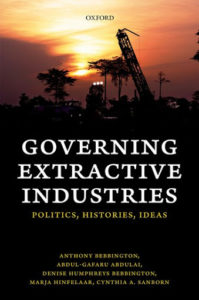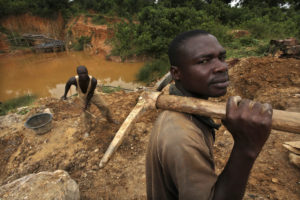| Ghana | Uganda |
| Kenya | Bolivia |
| Mozambique | Peru |
| Tanzania | Zambia |
Researching the politics of development
Natural Resources

Introduction
Natural resources such as mining, oil and gas can be a source of development and prosperity for states.
But often states become subject to the “resource curse”, a reliance on natural resources that actually undermines inclusive development.
It is often thought that countries can only avoid such problems if they have the right institutions in place. However, we take the view that much more important to effective natural resource government is the balance of power (or “political settlement”) within a country.
Key findings
The relationship between a state’s political settlements, resource extraction and inclusive development is directly shaped by historical processes of colonialism, global commodity prices, and both the type and geographic of the resources in question.
In countries with long histories of resource extraction and large quantities of hydrocarbons and/or minerals, the natural resource domain exerts a profound influence on the political settlement itself. Resource rich territories and socio-economic groups directly involved in resource extraction can significantly enhance their bargaining power. A large rentier sector can also change the nature of the ‘deals’ space and reduce a country’s overall quality of governance.
Africa’s new producers of oil and gas face a dilemma: following the end of the commodity super-cycle and growing shift towards greener forms of energy, should they continue to invest in oil and gas or leave their assets stranded? The response will likely be shaped by the degree to which elite projects of political survival and economic accumulation have become dependent on the flow of rents from hydrocarbons.
International actors have encouraged Africa’s new producers of oil and gas to adopt a remarkably similar set of ‘best-practice’ institutional arrangements. This agenda –including the separation of commercial and regulator functions and high-levels of transparency – draws on a selective reading of how effective forms of oil governance have emerged in different contexts, and includes an ideological bias against national oil companies. So far, it has produced very mixed results.
Listen to more about our findings on the UN Global Dispatches podcast
Case study
Context
In both Latin America and sub-Saharan Africa, the emergence of elite cohesion around a resource nationalist agenda within a dominant settlement is most likely to generate technocratic forms of governance and inclusive development outcomes. The more neoliberal approaches to resource governance that tend to prevail within competitive settings such as Ghana and Peru can generate profits more swiftly, some of which will be invested in development, whilst often undermining rules-based governance.
Capacity
The adoption of ‘best-practice’ institutional arrangements, including the ‘Norway’ model of oil governance, has often undermined the capacity of African countries to govern their oil sectors effectively. This is partly because the resulting fragmentation has converged with the rise of ‘resource factionalism’, helping to fuel inter-elite rivalries in countries like Kenya and Mozambique.
The best outcomes have occurred in countries where earlier efforts had been made by rulers to build high-capacity ‘pockets of effectiveness’, as around commercial activities in Ghana and regulatory capacity in Uganda.
Coalitions
Coalitions directly shape how natural resources are governed and the developmental outcomes that flow from this. This includes the transnational coalition that promotes particular forms of accountable and transparent governance, often in alliance with local civil society actors, and the coalitions between politicians and bureaucrats that shape the performance of regulators and state-owned enterprises.








